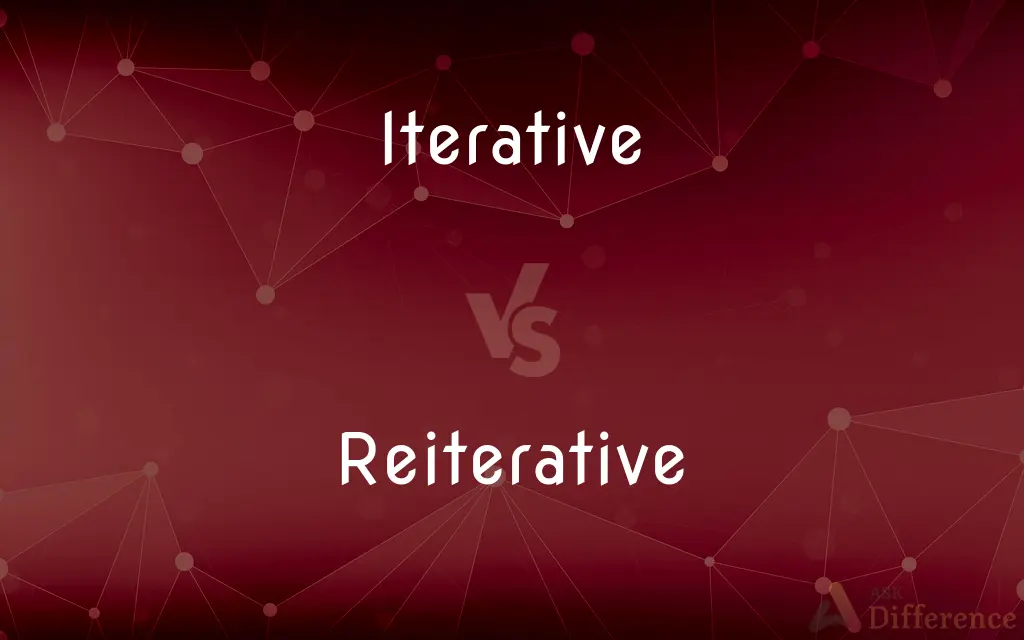Iterative vs. Reiterative — What's the Difference?
By Maham Liaqat & Urooj Arif — Updated on May 6, 2024
Iterative focuses on repetition for improvement or refinement, while reiterative emphasizes the repeated act of stating or doing something again.

Difference Between Iterative and Reiterative
Table of Contents
ADVERTISEMENT
Key Differences
Iterative processes are commonly used in software development, where incremental improvements are made through repeated cycles. On the other hand, reiterative often describes the act of saying or explaining something repeatedly to clarify or emphasize a point.
In project management, an iterative approach allows for continuous feedback and adjustments as a project progresses, whereas reiterative methods might involve restating or reviewing project goals and processes to ensure alignment and understanding.
Iterative learning involves repeated attempts to improve skills or knowledge, with each cycle building on the previous one. In contrast, reiterative learning might focus more on repeatedly reviewing the same content to reinforce memory or understanding.
In communication, being iterative means gradually developing and refining messages or strategies based on feedback, while being reiterative could imply repeatedly delivering the same message to reinforce a point or ensure it is understood.
Iterative design involves a cyclic process of prototyping, testing, and refining a product. On the other hand, reiterative design might involve repeatedly presenting the same design concepts to stakeholders to receive additional feedback or confirmation.
ADVERTISEMENT
Comparison Chart
Definition
Involves repetition for improvement
Involves repetition for emphasis
Common Usage
Software development, learning
Communication, teaching
Focus
Refinement and evolution
Clarification and reinforcement
Outcome
Progressive enhancement
Ensured understanding
Methodology
Cyclic process
Repetitive process
Compare with Definitions
Iterative
Pertaining to a method where repeated application enhances outcomes.
His iterative study habits improved his knowledge significantly.
Reiterative
Involving frequent repetition to emphasize or clarify.
The reiterative announcements at the airport kept passengers well informed.
Iterative
Characterized by repeated cycles in a process.
They used an iterative testing method to perfect the product design.
Reiterative
Characterized by the act of repeating something.
The teacher's reiterative explanation helped students memorize the concept.
Iterative
Describing a procedure done repeatedly for gradual enhancement.
The iterative feedback sessions helped improve the training modules.
Reiterative
Involving repetition or doing something again for emphasis.
His reiterative instructions ensured all employees understood the new policy.
Iterative
Involving a series of repetitions to achieve a closer approximation.
The mathematician's iterative calculations led to a more accurate model.
Reiterative
Pertaining to repeatedly stating or doing to reinforce.
The safety protocol was reiterative to ensure no steps were overlooked.
Iterative
Relating to or involving repetition of processes to improve a result.
The software team adopted an iterative approach to gradually refine the application.
Reiterative
Repetitive, especially for the purpose of emphasis or clarity.
Her reiterative speech reiterated the company's commitment to quality.
Iterative
The act or an instance of iterating; repetition.
Reiterative
To say or do again or repeatedly.
Iterative
A form, adaption, or version of something
The latest iteration of a popular app.
Reiterative
That involves reiteration.
Iterative
(Mathematics) A computational procedure in which a cycle of operations is repeated, often to approximate the desired result more closely.
Reiterative
(grammar) A word signifying repeated action.
Iterative
The process of repeating a set of instructions a specified number of times or until a specific result is achieved.
Reiterative
A word expressing repeated or reiterated action.
Iterative
One cycle of a set of instructions to be repeated
After ten iterations, the program exited the loop.
Reiterative
A word formed from another, or used to form another, by repetition; as, dillydally.
Iterative
Of a procedure that involves repetition of steps (iteration) to achieve the desired outcome; in computing this may involve a mechanism such as a loop.
Reiterative
Marked by tedious repetition
Iterative
(grammar) Expressive of an action that is repeated with frequency.
Iterative
(grammar) A verb showing the iterative aspect.
Iterative
Repeating.
Iterative
Marked by tedious repetition
Common Curiosities
What defines an iterative process?
Iterative processes involve repeating cycles aimed at improvement each time.
Why use reiterative communication?
Reiterative communication ensures that the message is clearly understood and retained.
Can iterative methods apply to education?
Yes, iterative methods in education involve gradually introducing more complex concepts upon mastering previous ones.
Is reiterative learning effective for all students?
It can be particularly effective for those who benefit from repetition to solidify understanding.
In what scenarios is an iterative approach preferred?
In scenarios where gradual enhancement and adaptation are crucial, such as in software development.
How does iterative learning work?
Iterative learning builds knowledge or skills through continuous refinement and testing.
Does iterative design lead to better products?
Typically, yes, as it allows for continuous user feedback and product refinement.
What does reiterative mean?
Reiterative refers to the act of repeating something, usually to clarify or emphasize.
What is the main goal of a reiterative approach?
The main goal is to emphasize and clarify through repetition.
How does an iterative approach benefit project management?
It allows for flexibility and continuous improvement based on feedback.
How do iterative and reiterative processes differ in communication?
Iterative communication refines messages, while reiterative communication focuses on clarity through repetition.
What is the main advantage of reiterative processes in safety protocols?
They reinforce the importance and details of safety steps to ensure compliance and awareness.
Can a process be both iterative and reiterative?
Yes, some processes may incorporate both elements to both improve and emphasize.
Why might a teacher choose a reiterative teaching method?
To ensure students fully grasp and remember the material through repeated exposure.
What makes iterative feedback valuable in business settings?
It helps refine strategies and operations based on ongoing insights and evaluations.
Share Your Discovery

Previous Comparison
Crooked vs. Crook
Next Comparison
Schoolchild vs. StudentAuthor Spotlight
Written by
Maham LiaqatCo-written by
Urooj ArifUrooj is a skilled content writer at Ask Difference, known for her exceptional ability to simplify complex topics into engaging and informative content. With a passion for research and a flair for clear, concise writing, she consistently delivers articles that resonate with our diverse audience.













































